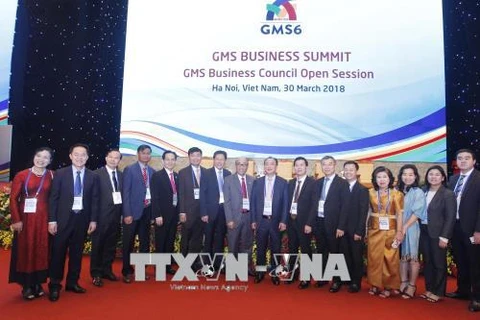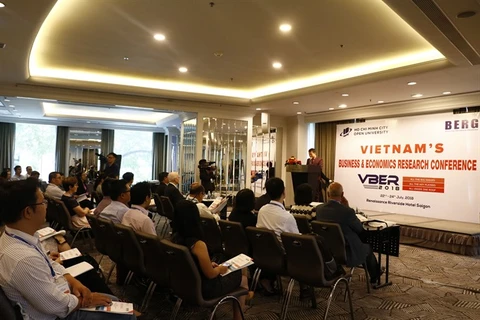HCM City (VNA) – A workshop was held in Ho Chi Minh City on November 2 to discuss measures to further promote the development of Vietnam’s supply chain financing market in the digital age.
The event, jointly organised by the APEC Business Advisory Council (ABAC) and the Ministry of Planning and Investment (MoPI), was part of activities for the “Upgrading micro-, small-, and medium-sized enterprises (MSMEs)’s access to finance in the digital age” project.
Experts focused their discussions on financial supply chains and financial services in the linkage between foreign investment firms and local suppliers.
According to CEO of BCR Publishing Ltd Michael Bickers, financial support for supply chains can be understood as a form of supply chain financing before factoring.
At present, cross-border supply chain financing efforts are underway to limit the complexity of administrative procedures and reduce the time spent waiting for administrative handling procedures, making use of digitisation technology, he said.
Technology can help to create tremendous influence and progress, enabling the launch of a smooth supply chain financing programme, while MSMEs are also able to access the programme easier and faster, he added.
Statistics show that in Vietnam, more and more lenders, leading companies, buyers, suppliers, and service providers are starting to take part in business and supply chain financing activities more seriously.
However, the challenge for the field are issues related to the business and investment environment, knowledge, experience, and technological solutions in digitising trade finances and supply chains in the region, as well as in the global market.
According to Nguyen Hoa Cuong, Deputy Director of the MoPI’s Department of Enterprise Development, Vietnam has been implementing a strategic plan on developing domestic supporting industries, with the aim of meeting 70 percent of the demand by 2030.
Ministries and sectors have taken measures to link foreign direct investment enterprises with local SMEs and suppliers, he said, adding that the banking system has been increasingly involved in not only the supply chain financing, but also in infrastructure investment.
This shows that technology has promoted change, improved perception, and brought opportunities to market development, he noted.
Meanwhile, Jinchang Lai, an expert of the World Bank, underlined the important role played by governments in promoting the supply chain financing market.
Governments of many countries have been engaging with the market to improve the competitiveness of domestic supply chains, in particular making it easier for SMEs to join global supply chains, he said.
Promoting the supply chain financing market is also a solution to boosting capital flows into production and business, contributing to further economic growth, he noted.
Participants said the development of the market in Vietnam is important, stressing that it is necessary to build initiatives and specific policies to boost this kind of activity.
The Vietnamese Government should provide specific regulations and guidelines to create a legal basis for entities, such as banks or different economic sectors to participate in the supply chain financing market, the suggested.
Vuong Thi Huyen, Deputy General Director of Vietnam International Commercial Joint Stock Bank (VIB), said that the market in Vietnam is still modest, in need of motivation to be pushed forward, especially SMEs.
Participants said in the Asia-Pacific region, some types of electronic finance platforms have proven to be valuable to strengthening the link among members of supply chains and towards increasing the ability to attract financial service providers.
This is a trend that will create a driving force to support the development of enterprises in both quantity and quality, in accordance with the target set by the Vietnamese Government for the next few years.–VNA
The event, jointly organised by the APEC Business Advisory Council (ABAC) and the Ministry of Planning and Investment (MoPI), was part of activities for the “Upgrading micro-, small-, and medium-sized enterprises (MSMEs)’s access to finance in the digital age” project.
Experts focused their discussions on financial supply chains and financial services in the linkage between foreign investment firms and local suppliers.
According to CEO of BCR Publishing Ltd Michael Bickers, financial support for supply chains can be understood as a form of supply chain financing before factoring.
At present, cross-border supply chain financing efforts are underway to limit the complexity of administrative procedures and reduce the time spent waiting for administrative handling procedures, making use of digitisation technology, he said.
Technology can help to create tremendous influence and progress, enabling the launch of a smooth supply chain financing programme, while MSMEs are also able to access the programme easier and faster, he added.
Statistics show that in Vietnam, more and more lenders, leading companies, buyers, suppliers, and service providers are starting to take part in business and supply chain financing activities more seriously.
However, the challenge for the field are issues related to the business and investment environment, knowledge, experience, and technological solutions in digitising trade finances and supply chains in the region, as well as in the global market.
According to Nguyen Hoa Cuong, Deputy Director of the MoPI’s Department of Enterprise Development, Vietnam has been implementing a strategic plan on developing domestic supporting industries, with the aim of meeting 70 percent of the demand by 2030.
Ministries and sectors have taken measures to link foreign direct investment enterprises with local SMEs and suppliers, he said, adding that the banking system has been increasingly involved in not only the supply chain financing, but also in infrastructure investment.
This shows that technology has promoted change, improved perception, and brought opportunities to market development, he noted.
Meanwhile, Jinchang Lai, an expert of the World Bank, underlined the important role played by governments in promoting the supply chain financing market.
Governments of many countries have been engaging with the market to improve the competitiveness of domestic supply chains, in particular making it easier for SMEs to join global supply chains, he said.
Promoting the supply chain financing market is also a solution to boosting capital flows into production and business, contributing to further economic growth, he noted.
Participants said the development of the market in Vietnam is important, stressing that it is necessary to build initiatives and specific policies to boost this kind of activity.
The Vietnamese Government should provide specific regulations and guidelines to create a legal basis for entities, such as banks or different economic sectors to participate in the supply chain financing market, the suggested.
Vuong Thi Huyen, Deputy General Director of Vietnam International Commercial Joint Stock Bank (VIB), said that the market in Vietnam is still modest, in need of motivation to be pushed forward, especially SMEs.
Participants said in the Asia-Pacific region, some types of electronic finance platforms have proven to be valuable to strengthening the link among members of supply chains and towards increasing the ability to attract financial service providers.
This is a trend that will create a driving force to support the development of enterprises in both quantity and quality, in accordance with the target set by the Vietnamese Government for the next few years.–VNA
VNA
























